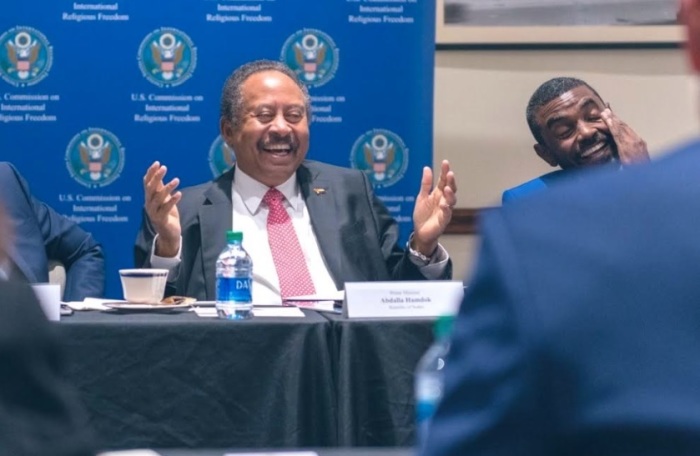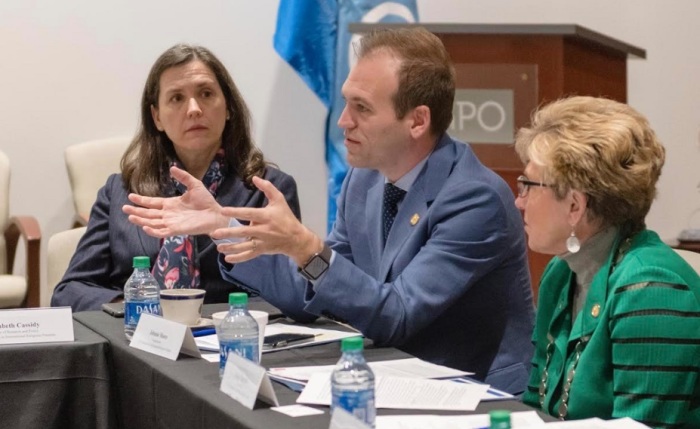Sudan prime minister meets with USCIRF, shares plans to improve religious freedom

Sudan’s new Prime Minister Abdalla Hamdok met with the U.S. Commission on International Religious Freedom Thursday and assurances were made that the country that is ranked sixth-worst in the world for Christian persecution is working to improve liberty and human rights.
Hamdok, who was appointed in August, visited Washington, D.C. last week months after a coup d'état upended the leadership of dictator Omar al-Bashir and paved the way for a transitional government.
Hamdock’s visit marked the first time that the leader of the Sudanese government has visited Washington in three decades. Sudan has been listed for several years on the State Department’s list of “countries of particular concern” that engage in or tolerate "systematic, ongoing, and egregious violations of religious freedom."
During his trip, the minister and other Sudanese officials met with commissioners from the congressionally-mandated commission responsible for making recommendations to the U.S. State Department regarding religious freedom worldwide.
USCIRF Commissioner Johnnie Moore told The Christian Post that commissioners were informed of a number of plans to improve the condition of religious liberty in Sudan, which ranks near the top of Open Doors USA’s list of top-50 countries where Christians are most persecuted.
Sudan in recent years has come under much international scrutiny for confiscating church property and other religious freedom and human rights abuses, including the sentencing of Christian mother Mariam Ibrahim to death in 2014 for the crime of apostasy.
One of the hopes expressed by officials in the meeting, Moore said, was to change the apostasy and blasphemy laws in Sudan’s Criminal Code in the next eight weeks.
Sudan finalized a Constitutional Declaration earlier this year for the transitional period. It no longer references Islam as the primary source of law, Moore said.
Additionally, Sudan reportedly repealed a public order law that gave security forces broad authority to enforce religious-based moral teachings, such as women being harassed for “inappropriate dress.”
Sudan is said to have also held several workshops related to religious freedom and legislative reform, the commissioners were told.
“If the Sudan continues on the path they've started, and according to the very clear plan they elicited to us today, then they have the potential of becoming the nation most astonishingly transformed in the shortest period of time,” Moore wrote in an email.
“Don't get me wrong — there's a ton of work that needs to be done, but the people we met with today know what needs to get done, they know how to do it, and they have made meaningful progress, already.”
According to Moore, USCIRF commissioners were also assured that the government plans to publish new laws and procedures for houses of worship. The transitional government is said to have met with evangelical leaders of specific cases of church property disputes.

Additionally, a ministry office for church affairs has been established to ensure churches are self-administered without government interference, commissioners were told.
Moore said the Sudanese people are “ready and demanding” change.
“Honestly, just two years ago, no one would have imagined we would be in this discussion with this nation,” Moore remarked. “Truly, amazing. Prime Minister Abdalla Hamdok is a transformative figure.”
Fellow USCIRF Commissioner Anurima Bhargava, a civil rights lawyer by trade, commended Sudan for passing new reforms quickly to address women’s rights and repeal the law that permitted flogging women who wore pants.
The United Kingdom-based Christian advocacy group Christian Solidarity Worldwide expressed concern with the Sudanese criminal code. CSW notes that while it welcomes the news of the appeal of the public order laws, “the country's Criminal Code has not been amended and can still be used.”
According to CSW, the repealed public order laws were implemented in each state while the national laws remain in effect through the 1991 Criminal Code.
“[I]t is under these laws that religious minority women have historically been arrested, fined and given lashes on public indecency charges,” a CSW press release notes.
Faith McDonnell, Director of Religious Liberty Programs and of the Church Alliance for a New Sudan at the Washington, D.C.-based think tank Institute on Religion & Democracy, told CP that the “signs are good” that Sudan could be moving in the right direction.
“After 25 years of observing the Sudan of jihad and genocide, I hope that the U.S. government will use wisdom and prudence in its engagement with Sudan,” she explained. “Things with the new prime minister and some of the other government ministers sound good, but it remains to be seen what their performance is like.”
McDonnell expressed two concerns. One is that she has heard from Sudanese friends that Hamdok may not have the “power structure to change things” even if he is sincere about change.
“I also want to see changes for Sudan’s marginalized people groups,” she said. “So far, nothing much seems to have changed for the black African ethnicities in Sudan. The Khartoum Arab Sudanese who began complaining after they felt the economic pinch are getting what they want, but they have not shown much solidarity for the people of Darfur, or of the Nuba Mountains, Or of Blue Nile state, or even for the Beja in Eastern Sudan.”
“It is when these ethnicities are treated completely equally, is completely equal and first-class citizens that we should begin to really believe that change has come to Sudan,” McDonnell argued.
McDonnell said that she finds it “breathtakingly incongruous” that after four decades of “genocidal behavior” anyone can say Sudan can be trusted as an ally in national and global security issues.
“[A]s recently as 2017 they were facilitating the movement of the Islamic state from the Middle East to Africa,” McDonnell said. “I know that was Bashir, but many of the same people with the same mentality are still in Sudan.”
Follow Samuel Smith on Twitter: @IamSamSmith
or Facebook: SamuelSmithCP





























